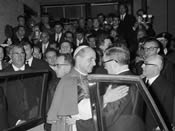In the Gospel-story of the rich young man, we read: “And behold, a certain man came to him and said, ‘Good Master, what good work shall I do to have eternal life?’ He said to him, ‘Why dost thou ask me about what is good? One there is who is good, and he is God. But if thou wilt enter into life, keep the commandments.’ He said to him, ‘Which?’ And Jesus said, ‘Thou shalt not kill, Thou shalt not commit adultery, Thou shalt not steal, Thou shalt not bear false witness, Honor thy father and mother, and, Thou shalt love thy neighbor as thyself.’ The young man said to him, ‘All these I have kept; what is yet wanting to me?’ Jesus said to him, ‘If thou wilt be perfect, go, sell what thou hast, and give to the poor, and thou shalt have treasure in heaven; and come, follow me.’ But when the young man heard the saying, he went away sad, for he had great possessions.” (Mt 19:16-22).
At the outset, it should be good to note that the demand of selling everything to give to the poor is specific to this young man. “Actual renunciation of riches is not demanded of all; Matthew counts the ‘rich’ Joseph of Arimathea as a disciple of Jesus (Mt 27:57). But only the ‘poor in spirit’ (Mt 5:3) can enter the kingdom and, as here, such poverty may entail the sacrifice of one’s possessions.” (New American Bible, note at Mt. 19:16-30). Also: “This story does not set up a ‘two-tier’ morality, that of those who seek (only) eternal life (v.16) and that of those who wish to be perfect (v.21). It speaks rather of the obstacle that riches constitute for the following of Jesus and of the impossibility, humanly speaking, for one who has many possessions (v.22) to enter the kingdom (v.24). (
The rich young man in this episode “went away sad”—abiit tristis—because he could not let go of his many possessions to follow our Lord. He refused his vocation from God.
“Sad” does not only describe the subjective state of this rich young man: it is also objectively a sad scene, viewed from outside that character, even from our standpoint, and down the centuries. Turning away from God—which is of the essence of all sin—always involves a breakdown, a tearing apart, a failure, a wounding inside the person, since he would then be acting contrary to his authentic nature, which is to tend towards God. Sadder still would it be when this turning away from God of the human individual were made in reference to his “vocation”, to a call from God towards a lifelong “path” or lifetime project, God’s plan for each person, by which that individual were to attain his ultimate good. It is sadder because this refusal of a vocation from God is more far-reaching in its consequences.
On the surface, the turning away of the rich young man may not rank as “sin”: his choice was not patently “immoral”, since wealth is not an evil in itself. On the other hand, since it is of our authentic human nature to obey God in everything, there is in the turning away of this rich young man a radical deviation from his good. Had he known that it was God Who was telling him, in no uncertain terms, to sell everything, give to the poor, and to follow Christ, this refusal to obey would have constituted a most grievous sin. Indeed, it may be precisely the lack of “certainty” of the “vocation”—whether it is what God wants—which diminishes, in many cases, the malice and sinfulness of a vocation that is “lost” or refused.
With regard to “conventional” or common “sins”, which are obvious transgressions of the natural moral law (especially summarized in the Decalogue), the turning-away from God—the lawgiver—is clear. On the other hand, refusal of a “vocation” may not necessarily involve an obvious moral choice: to marry a specific person or not, to dedicate oneself to a specific way of life; to be lay, cleric, or religious; etc.; do not involve choosing between right and wrong, between good and evil in se. The evil would lie in picking an option other than what God wants; and since the vocation from God would not be expressed in a compelling manner nor as clearly coming from Him—God values human freedom so much! one could not be one hundred percent sure!—the refusal of a vocation could arguably be morally neutral. Still, since God’s plan for each one of us would always be the best, even assuming that there was a sincere effort to discern God’s Will, our refusal would result, at least, in losing a priceless opportunity. The rich young man of the Gospels could have become one of the Twelve; and his refusal amounted to losing that great honor forever.
St. Josemaria writes:
“Ask yourself now (I too am examining my conscience) whether you are holding firmly and unshakeably to your choice of Life. When you hear the most lovable voice of God urging you on to holiness, do you freely answer 'Yes'? Let us turn our gaze once more to Jesus, as he speaks to the people in the towns and countryside of
O.C.P.A.J.P.M.








